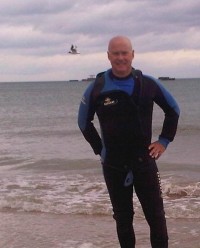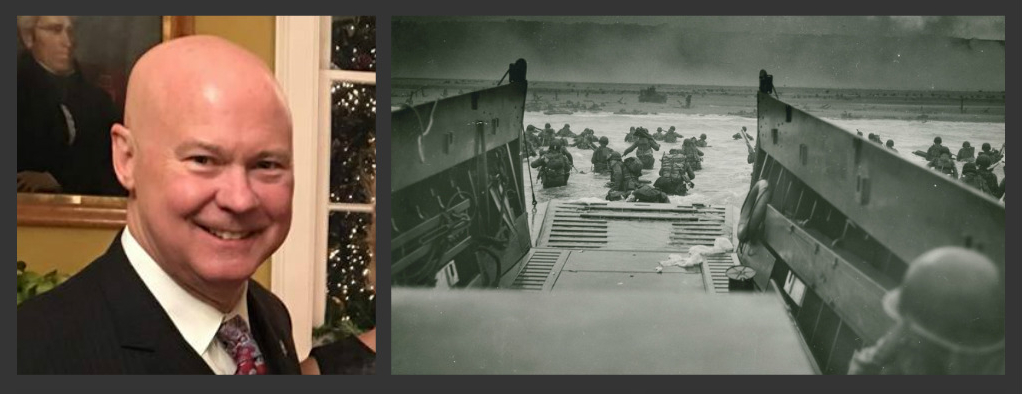A Tribute to my father on the 75th anniversary of the NORMANDY INVASION
By Tom Mullikin
[A version of this story was published by Canada Free Press, July 27, 2010.]
NORMANDY, FRANCE – A cold, rainy day greets my wife and me. The day is July 14, 2010. It’s a day, weatherwise, that might have easily resembled the conditions encountered by Allied soldiers as they fought their way from the sea onto the enemy held shoreline, followed by the inexorable grind inland toward the goal of ending the tyranny of Nazi Germany.
 More than 66 years after the Normandy Invasion, June 6, 1944 [today on the 75th anniversary of that invasion], we begin our journey attempting to get our heads around the experiences of my father, Charlie Mullikin, an American soldier who landed here on the Normandy coast and was ultimately wounded in action.
More than 66 years after the Normandy Invasion, June 6, 1944 [today on the 75th anniversary of that invasion], we begin our journey attempting to get our heads around the experiences of my father, Charlie Mullikin, an American soldier who landed here on the Normandy coast and was ultimately wounded in action.
On this day, we are enjoying SCUBA diving onto many the great shipwrecks lying offshore. White caps are pounding our small rubber Zodiac boat. Visibility is near zero—no more than five feet at best. I can only imagine the violent and terrible cold shock to those American, British, and Canadian soldiers carrying their packs, weapons, and ammunition through the bloody, churning surf.
I am also reminded of the Navy frogmen, predecessors to our modern Navy SEALs, who suffered 50-percent casualties as they removed the defensive obstacles placed on the beach and in the surf by the Germans.
I made this trek to celebrate my 50th birthday. More importantly, I wanted to recognize the price of freedom and remember the selfless contributions made by my father and other citizen soldiers of his era—appropriately christened, “The Greatest Generation.”
I am particularly proud of my father, a member of a special ad hoc reconnaissance unit of the 407th Infantry Regiment, affectionately known as “Rogers’ Raiders.” Their actions – though little known – were stellar at Normandy, and the fame of their exploits would spread Army-wide during the period of the Battle of the Bulge in December 1944. The Raiders – composed entirely of volunteer combatants trained for direct-action operations and deep reconnaissance – were led by 1st Lt. Roy “Buck” Rogers.
U.S. Army records describe one of their night raids:
“At exactly 0300 Buck Roger’s Night Raiders of the 407th Infantry pushed out into darkness, out into the narrow torrential Roer (River). … A German machine gun opened up not 50 yards away … Two long minutes later … the boats hit the Roer’s east bank. …With clocklike precision dark figures fanned out around the ominous machine gun. …One man returned the fire. Another grasped his grenade. A good throw. A dull thud. A scream. Silence.
“One group… swung toward the railroad bounded by a dense minefield … The rest of the patrol slugged south mopping up one nest after another. At H-hour—30 minutes later—the first assault wave of the 407th Infantry crossed without a hitch. Their bridgehead, the first across the Roer, was established.
“When the 30 minutes of intense action had ended, the Raiders had destroyed five machine gun nests along with six other automatic weapon positions, killed 15 and captured eight of the enemy … all without losing a single American.”
In spite of the accolades and decorations awarded my father—among them the Purple Heart for wounds suffered from an enemy grenade, and a Bronze Star for heroism— like so many Americans of his generation, he never considered himself a hero. He was simply doing his job, he would modestly say.
But for the rest of us – as well as future generations – my dad’s accomplishments protected our freedom and way of life.
As I stroll these same beaches and feel the same salt-wind and spray that thousands of surely-frightened young men must have felt nearly seven decades earlier; it becomes starkly apparent to me that the freedom and way of life I speak of will continue only with the same courage required here in 1944, the same blessings from God, and our continued appeals for those blessings.
– Maj. Gen. (Ret.) Thomas S. Mullikin, S.C. Military Dept. (former commander of the S.C. State Guard) is a former U.S. Army JAG officer. His SCUBA diving and mountain-climbing expeditions have led him to remote destinations around the world. A practicing energy and environmental attorney and university professor, he is currently chair of the S.C. Floodwater Commission.
